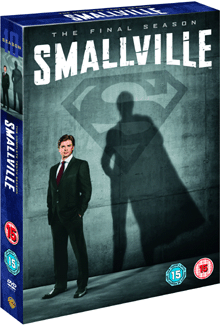 So we’re here, ten years later, at the final season of a show that nobody really expected to soar, but ended up lasting longer than anything Joss Whedon ever produced.
So we’re here, ten years later, at the final season of a show that nobody really expected to soar, but ended up lasting longer than anything Joss Whedon ever produced.
The comparison to the Buffyverse is appropriate – early criticism of Smallville pointed to its pale imitation of the ‘monster of the week’ idea of a local high-school kid being sent mad and scaly by the locality’s supernatural/alien weirdness. It might look pretty, but the property values in town Smallville are probably a steal.
And in any case, this gleeful ripping off from any show around was one of Smallville’s greatest strengths: like the lead character, it was always looking for another identity to hide behind – one week, it was Buffy, the next it was stealing from 24, with a return trip to Dawson’s Creek along the way.
The other great strength – but ultimately also the show’s Kryptonite – was that the writers had a healthy lack of respect for the story’s greater mythology: so what if we ‘know’ that both Ma and Pa Kent survive to retirement, living on the farm that Clark called his childhood home, or that Lex Luthor continues to be Superman’s arch-enemy, all the while blissfully unaware of his true identity?
Smallville played fast and loose with these ideas as soon as an actor signaled their intentions to leave, meaning that season cliffhangers could get ever more dangerous, breathless, and more impossible to leap over than a very high building.
This is what hobbles the final season somewhat – the idea that we’ve done all this before, that we’ve seen already Clark struggle with his destiny and be coaxed back into action by his father(s). We’ve seen Chloe pretty much certainly killed off with no chance of a resurrection, just for the crime of being a more intelligently created character than the ‘official’ Lois Lane. And, of course, we’ve seen them play around with the teasing gag of ‘no flights, no tights’. It means that there’s no great revelation and no huge amount of peril anymore.
To be fair, to a lesser or greater degree, that is somewhat the intention: aware that, despite whatever games they’ve played with our expectations in the past, they now have twenty-odd episodes to set everything up for the legend to come, this entire season is merely place-setting. Since this rarely if ever happens in genre television – not until the very final episode, at least – this is both refreshing and frustrating.
One of the best early episodes is also the one that investigates that theme for the rest of the series, while also managing to look forward ten years to a possible Metropolis spin-off. This episode is a homecoming of sorts, as Clark and co attend a reunion at Smallville High, and it’s one of the most infectiously fun episodes in a series that can sometimes be as sombre and po-faced as Tom Welling’s best acting, although it is startling to see a flashback sequence toggle quickly from Welling’s face now to Welling’s face then. But then, we’ve all grown up in the mean time.
Speaking of which: as Buffy discovered, it doesn’t matter how stuffed to the rafters with pretty teens your teen drama is, it loses something very significant when the elder characters are sidelined. So it’s good that in this final season, the elder statesmen return – such as Annette O’Toole as Martha Kent, although there’s at least one returning character in the final few episodes who is not treated well, with no real respect for his previous development within his character arc, turning up merely to facilitate another character’s return (the logistics of which don’t really make a great deal of sense when you look at them too closely).
This isn’t so much Superman: The Early Years as much as Justice League America: Year One. This is no bad thing, and indeed, it’s the way the show has been progressing in the couple of years, meaning that the storylines aren’t always having to be supported by Clark’s manly shoulders.
But compare and contrast with pretty much any genre fiction of the past few years – even Harry Potter and the Twilight series – and you’ll see how much the respective casts were allowed to develop into adults. Here, the cast have ‘grown-up’ lives, but drawn very broad and simple, with any ambiguities simply there as a plot point – as in, are-they/aren’t-they a super-villain? If we’re honest, though, this is largely down to the primary colour story-telling of the original DC creation.
So, in the end, Smallville is all about Smallville and the notion that no hero can exist without his friends.
Even so, it’s annoying that – since Smallville is so fond of playing with the Christopher Reeve era Superman iconography – when, finally, there’s a whisper of the long promised ‘flights and tights’ and the John Williams theme is finally allowed to play at full blast, it’s cut short to be replaced by the sub-Mark Snow closing muzack. Even in the final moments, Smallville isn’t quite allowed to fly.
![]()
Released on DVD and Blu-ray on Monday 31st October 2011 by Warner H ome Video.
What did you think of Smallville‘s final season? Let us know below…

